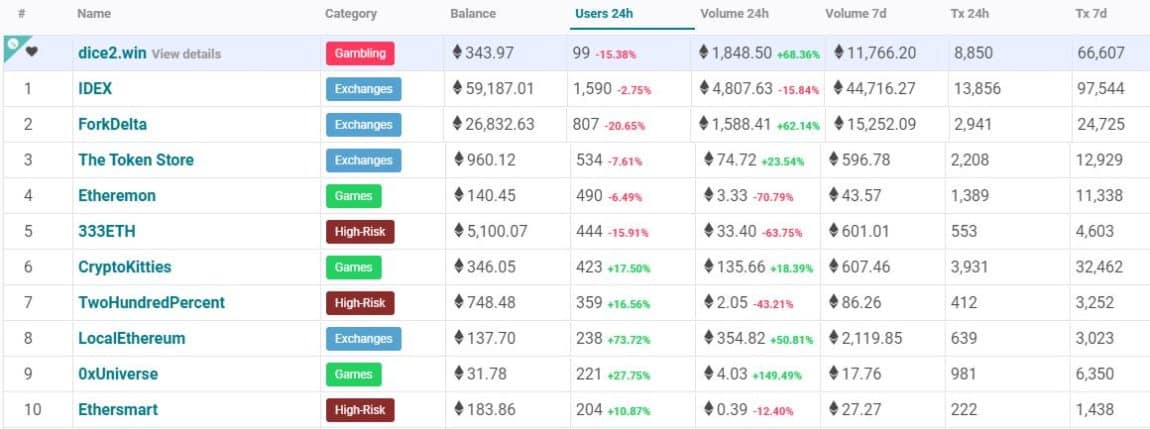Decentralized[?] Ethereum Exchange IDEX to Add More IP Blocks, Force KYC

IDEX, formerly known as a “decentralized” Ethereum exchange (DEX), has announced that its service will soon feature expanded regional restrictions and KYC policies comparable to those enforced on most centralized cryptocurrency trading platforms.
Ethereum Exchange IDEX Moves to Comply with Crypto Regulations
The operator of IDEX, the Panama-registered Aurora Labs S.A., announced the new changes on Nov. 1, stating that increased regulatory enforcement and recent statements from a CFTC commissioner had led the company to believe that it could not continue to operate without a robust KYC/AML framework but would attempt to introduce the new measures with “as little friction as possible for users.”
Last week, as CCN.com reported, the exchange — which apparently already restricted users from North Korea and Iran — announced that it would begin blocking users with New York IP addresses. Now, Aurora says that it will expand the regional block even further, widening its net to include Cuba, Syria, Crimea, and Washington state.
Other things equal, the IP ban would likely have proven to be more of an inconvenience than a true prohibition, as IP restrictions could easily be circumvented with a VPN. However, confirming fears of many IDEX users, the “decentralized” exchange, which heretofore allowed users to trade on the platform without registering accounts, will require users to undergo the same sort of identity verification and other KYC/AML measures they would expect to encounter when trading on a conventional exchange, such as Coinbase, Binance, or Upbit.
Over the past 24 hours, IDEX ranked just inside the top 100 exchanges as measured by trading volume, which amounted to about $2.1 million across 450 different mostly-illiquid ETH/ERC-20 token trading pairs.
However, while just a drop in the bucket relative to the $11 billion in global daily trading volume, DappRadar indicates that IDEX is nevertheless the most popular decentralized application (dApp) with approximately 1,600 daily active users — more than four times the active user base of CryptoKitties, whose creator just raised $15 million.
Taking the ‘D’ out of IDEX

In a lengthy post explaining the new policies, Aurora Labs CEO Alex Wearn argued that the question of centralization is not a binary choice. Rather, he said that there is a spectrum that exists between the two poles “centralized” and “decentralized,” and that it’s functionally impossible to offer a user-friendly service that also features complete decentralization.
IDEX seeks to improve upon conventional exchanges by affording users the ability to retain control of their funds while they trade on the platform, using an off-chain order-book to facilitate transactions while settling trades through an on-chain smart contract. Nevertheless, Aurora Labs oversees that order-book and signs the transactions that execute on-chain settlement.
This, Wearn, wrote, enhances the user experience but renders Aurora Labs liable for the activities that occur on the platform, and he conceded that it’s time to “call a spade a spade” and acknowledged that IDEX — despite its name — is not truly a DEX in the sense in which that term is most often used.
He said:
“Not every project can be successfully launched in the shadows by Satoshi Nakamoto. So, we’ll call a spade a spade and address the semantics that seem to be driving this confusion. IDEX is not a ‘DEX’ in its current state. At this point the best way to describe IDEX is as a ‘non-custodial’ or ‘hybrid-decentralized’ exchange.”
Wearn further alleged that this “hybrid-decentralized” characterization is not unique to IDEX, even if other platforms have eschewed the user experience to increase decentralization, e.g., through the use of clunky on-chain order-books. He said, “But this semantics issue is by no means unique to IDEX. We believe that no DEX is decentralized. As long as a project has a website, off-chain orderbook, or known team, they are not ‘fully decentralized.'”
Taking the argument further, he said that, particularly considering CFTC Commissioner Brian Quintenz’s belief that smart contract developers should be liable for how these services are used (Quintenz stressed that this is not official agency policy), no DEX could conceivably implement the top-to-bottom censorship resistance necessary to flout regulations governing cryptocurrency trading.
He concluded:
“The operations of a truly censorship resistant DEX would be unstoppable even in the face of pressure from nation states. None of the existing DEXs are censorship resistant — with DNS records that can be hijacked, and GitHub repositories to take down (certain elements of the stack are resistant, such as 0x & EtherDelta smart contracts, but there are non-resistant components that bring liquidity together). This means that at the end of the day, smart contract or not, every project may be subject to pressure from regulators.”
Featured Image from Shutterstock